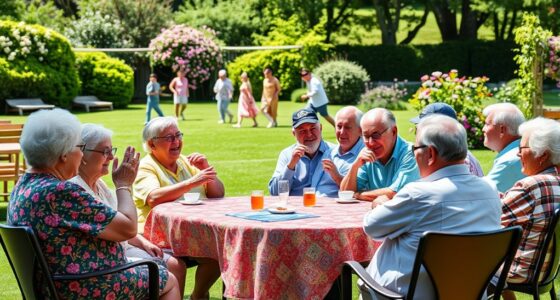You can boost your cognitive health and stay socially engaged by enjoying games, puzzles, and brain activities tailored for seniors. Activities like crosswords, Sudoku, memory games, or brain-training apps help sharpen your mental skills and keep your mind active. Combining these with outdoor activities or music can make your routine more enjoyable and holistic. Keep exploring different options, and you’ll discover many ways to keep your brain healthy and vibrant every day.
Key Takeaways
- Incorporate puzzles like crosswords and Sudoku to enhance cognitive skills and mental agility.
- Use memory games and matching activities to stimulate brain regions linked to recall and recognition.
- Engage in musical activities such as singing or instrument playing to evoke memories and boost emotional well-being.
- Combine outdoor activities like gardening or walking with music for comprehensive physical and mental stimulation.
- Focus on enjoyable, social games that promote interaction and cognitive engagement for sustained mental health.

Engaging in games, puzzles, and brain activities can considerably boost cognitive health and overall well-being for seniors. These activities not only sharpen your mind but also help you stay connected and active, which is essential as you age. Incorporating diverse activities like music therapy and outdoor adventures can make this journey enjoyable and effective.
Music therapy stands out as a powerful way to stimulate your brain. When you listen to or create music, multiple areas of your brain activate, including those responsible for memory, emotion, and coordination. Singing along to familiar tunes can evoke positive memories, lifting your mood and reducing feelings of loneliness. Playing musical instruments, even simple ones like a tambourine or keyboard, challenges your motor skills and enhances neural connections. Music therapy sessions can be tailored to your preferences, making them both emotionally uplifting and cognitively beneficial. Plus, the social aspect of group singing or music-making fosters a sense of community, which is essential for mental health.
Music therapy activates brain areas linked to memory, emotion, and coordination, lifting mood and fostering community connections.
Outdoor activities are equally important, offering a natural environment that encourages physical movement and mental engagement. Regular walks in the park, gardening, or even birdwatching can stimulate your senses and provide gentle exercise. These activities help improve circulation, boost mood, and enhance your overall vitality. Being outdoors exposes you to natural light, which supports your sleep-wake cycle and vitamin D production—both crucial for brain health. Additionally, outdoor activities often involve social interaction, whether you’re chatting with fellow walkers or participating in group gardening projects. This social engagement helps combat feelings of isolation and keeps your mind alert.
Combining music therapy with outdoor activities creates a holistic approach to maintaining cognitive vitality. For example, you might listen to your favorite music during a walk or participate in outdoor concerts or dance events. These experiences stimulate your brain through multiple channels—auditory, physical, and social—creating a rich environment for mental exercise. Studies show that engaging in diverse activities can significantly reduce the risk of cognitive decline and promote mental agility. Engaging regularly in such activities keeps your brain active, reduces the risk of cognitive decline, and promotes a positive outlook on aging.
Ultimately, integrating music therapy and outdoor pursuits into your routine makes staying mentally sharp both enjoyable and sustainable. You don’t need to master complex puzzles or intense workouts; simple, consistent activities that resonate with you are enough to make a meaningful difference. By actively seeking out these engaging experiences, you support your cognitive health while enriching your life with joy and connection.
Frequently Asked Questions
How Often Should Seniors Engage in Brain Activities?
You should aim for brain activity frequency of at least 3 to 5 times a week for peak engagement. Regularly challenging your mind helps maintain cognitive function and reduces the risk of decline. Incorporate a variety of activities like puzzles, reading, or learning new skills. Consistency is key, so make brain exercises a routine part of your schedule to stay sharp and mentally active.
Are There Age-Specific Games for Different Senior Groups?
Yes, there are age-specific games designed for different senior groups. You should choose age-appropriate games that match their cognitive and physical abilities. Consider their cultural game preferences to keep them engaged and comfortable. For example, younger seniors may enjoy more active or competitive games, while older adults might prefer simpler, relaxing activities. Tailoring games to their age and interests helps boost mental sharpness and overall well-being.
Can These Activities Improve Memory and Cognitive Function?
Yes, these activities can improve your memory and cognitive function. Engaging in brain training exercises stimulates neural pathways, helping to enhance memory retention and mental agility. Regular participation in such activities encourages memory enhancement and keeps your brain active. By challenging your mind with new tasks and puzzles, you support cognitive health and potentially delay decline, making these activities a valuable part of your overall well-being.
What Safety Precautions Are Necessary During Physical Brain Games?
During physical brain games, you should prioritize fall prevention by keeping the activity area clear of obstacles and ensuring proper lighting. Always check that equipment is in good condition and stable before use to prevent accidents. Wear supportive footwear and encourage participants to take breaks if they feel dizzy or tired. These safety precautions help create a secure environment, allowing you to enjoy the activity while minimizing injury risks.
How Do Cultural Differences Influence Game Preferences for Seniors?
Cultural differences shape seniors’ game preferences more than you might think; it’s like different strokes for different folks. You’ll find that cultural traditions heavily influence which games they enjoy, with regional game preferences reflecting local history and values. To keep engagement high, tailor activities to their cultural background, ensuring familiarity and comfort. This approach helps seniors feel connected and respected, making the experience more meaningful and enjoyable for everyone involved.
Conclusion
By engaging in games, puzzles, and brain activities, you hold the key to opening a vibrant, fulfilling life. These activities aren’t just pastimes—they’re your armor against mental decline, your bridge to joyful connections, and your daily reminder that age is just a number. Embrace these challenges with enthusiasm, and watch your mind flourish like a garden in full bloom. After all, isn’t life at any age meant to be a beautiful adventure?









